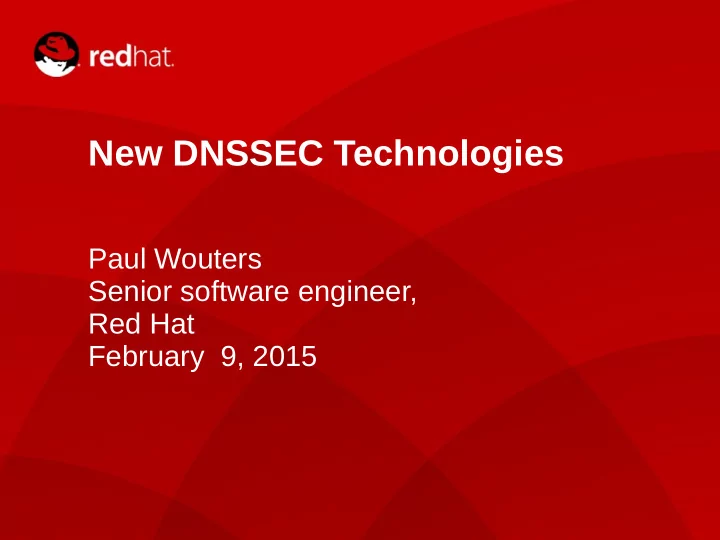

New DNSSEC Technologies Paul Wouters Senior software engineer, Red Hat February 9, 2015 1 Paul Wouters <pwouters@redhat.com>
*.fedoraproject.org PGP keys now in DNSSEC ● All Fedora Account System users have a user@fedoraproject.org email ● FAS web interface allows uploading PGP keyid (soon public keys itself) ● Publish PGP keys using DNSSEC ● draft-ietf-openpgpkey ● Retrieve from DNSSEC using dig dig +short +vc type61 `printf paul|sha224sum|cut -f1 -d\ `._openpgpkey.nohats.ca|sed 's/ [^ ]*//;s/\W//g'|xxd -r -p|gpg --import -n 2 Paul Wouters <pwouters@redhat.com>
Managing PGP keys in DNS for humans ● openpgpkey command from the hash-slinger package ● create, verify and download keys ● missing features: ● punycode support missing :) ● DNSSEC root key location confusion ● wrap long lines using ( braces ) syntax 3 Paul Wouters <pwouters@redhat.com>
openpgpkey –fetch to download a PGP key 4 Paul Wouters <pwouters@redhat.com>
openpgpkey –create to create DNS record 5 Paul Wouters <pwouters@redhat.com>
openpgpkey –verify to compare DNS with keyring 6 Paul Wouters <pwouters@redhat.com>
TODO: publishing Fedora distribution key ● Use DNSSEC to publish the PGP used to sign all packages ● Problem: ● Each version uses a different key ● But using fedora@fedoraproject.org 7 Paul Wouters <pwouters@redhat.com>
The hash-slinger package ● openpgpkey: create, verify and download PGP keys using OPENPGPKEY records ● sshfp: create and verify SSH host keys using SSHFP records ● tlsa: create and verify SSL certificates using TLSA records (missing STARTTLS support) ● ipseckey: create IPSECKEY records for Libreswan IPsec (Opportunistic Encryption) 8 Paul Wouters <pwouters@redhat.com>
openpgpkey-milter – A reference implementation ● A sendmail and postfix plugin to auto-encrypt email ● Uses OPENPGPKEY to find encryption key ● yum install openpgpkey-milter ● service openpgpkey-milter start ● add to /etc/postfix/main.cf: smtpd_milters = inet:127.0.0.1:8890 ● service postfix restart ● Biggest problem: it works (my email is routed from mx.nohats.ca to my own local mail server) 9 Paul Wouters <pwouters@redhat.com>
DNSSEC experience on laptops / phones ● dnssec-trigger + unbound per default in Fedora 22 ● Still need better integration with Network-Manager ● Roaming / switching networks, split-DNS and TTL ● Cache management (Should I stay or should I flush) ● More than 1 domain in split-DNS cannot be conveyed with DHCP or VPN (XAUTH) ● Touch “search domains” in /etc/resolv.org or not ? ● DNS over port 80/443 needs to maintain TCP connction (i.e via draft-ietf-dnsop-ens-chain-query) ● When do we trust the AD bit ? 10 Paul Wouters <pwouters@redhat.com>
DNSSEC design for servers, virtual machines and containers ● Very much a work in progress ● Avoid using a single caching resolver per container ● Avoid DNSSEC validation inside every application ? ● Problems with trusting the hypervisor/host for AD bit ? ● Root KSK rollover 11 Paul Wouters <pwouters@redhat.com>
Current project: IPsec with DNSSEC Opportunistic IPsec to protect against pervasive monitoring ● Anonymous IPsec (march 2015) (draft-ietf-ipsecme-authnull) ● Single side DNSSEC authenticated IPsec using DNS triggers (april 2015) ● Cloud encryption using reverse-DNS (may 2015) ● Mutual authenticated IPsec (june 2015) ● End result: draft-opportunistic-ipsec 12 Paul Wouters <pwouters@redhat.com>
Recommend
More recommend